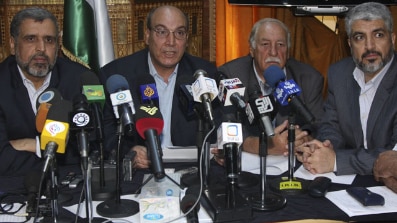 The Popular Front for the Liberation of Palestine joined with Hamas, Islamic Jihad, the Democratic Front for the Liberation of Palestine, and 7 other Palestinian factions to issue a joint statement in Damascus in opposition to the resumption of negotiations, direct or indirect, with Israel on August 15, 2010. The joint statement, read at a press conference by Comrade Dr. Maher al-Taher, member of the Political Bureau of the Popular Front for the Liberation of Palestine and leader of its branch in exile, warned of “serious repercussions of continuing the policy of concessions and compromises of Palestinian national rights.”
The Popular Front for the Liberation of Palestine joined with Hamas, Islamic Jihad, the Democratic Front for the Liberation of Palestine, and 7 other Palestinian factions to issue a joint statement in Damascus in opposition to the resumption of negotiations, direct or indirect, with Israel on August 15, 2010. The joint statement, read at a press conference by Comrade Dr. Maher al-Taher, member of the Political Bureau of the Popular Front for the Liberation of Palestine and leader of its branch in exile, warned of “serious repercussions of continuing the policy of concessions and compromises of Palestinian national rights.”
The 11 factions, including the PFLP, Hamas, Islamic Jihad, the DFLP, the General Command, and others, met on Sunday in order to discuss the issue of a potential Palestinian Authority return to negotiations and to make it clear that resuming such negotiations under U.S. authority, whether direct or indirect, places the fundamental rights of the Palestinian people as subject to the dictates of the U.S. and Zionism. The factions’ statement was issued jointly and read by Comrade Taher; it said that the goal of the U.S. and its strategic ally, the Zionist state, “aims at the liquidation of the national rights of the Palestinian people, while covering up the criminal practices of the occupation in building settlements, Judaizing Jerusalem, and besieging Gaza.” The statement went on to say that the occupation intends to create “facts on the ground” whereby the perennial presence of occupation Israeli forces on Palestinian land is legitimized through such negotiations.
Comrade Taher said, “The Zionist/U.S. pressure to conduct direct negotiations is an attempt to provide cover for the U.S. and Israel’s aggressive plans for the region.” The statement went on to say that “in a time of a growing international movement in solidarity with the Palestinian people and their just cause, and increasing isolation of Israel as a racist state, the U.S. and Israel are insisting on direct negotiations in order to provide a lifeline to lift the isolation of the criminal occupation state.”
The statement called for an end to internal division and urged that, instead of negotiations, the Palestinian Authority concentrate on building national unity and “stop betting on the futile negotiations, and instead adhere to Palestinian national rights and constants and the choice of resistance to liberate the land and end the occupation.”
The head of the Political Bureau of Hamas, Khaled Meshaal, said the meeting of the factions was “exceptional in terms of the quality and number and weight of the factions in the Palestinian arena and what the meeting represents in the Palestinian political context. It is exceptional in its timing in light of the Israeli aggression and the ongoing American pressure on the region,” emphasizing that the statement rejected both direct and indirect negotiations and reflected a wide range of Palestinian political opinion.
The PFLP also issued a statement on August 15, 2010, emphasizing that there is an urgent and historic mission for national salvation and national unity of the Palestinian people, their political and social forces, and their national institutions, and that the Palestinian leadership must reject any U.S. pressure to push Palestinians into direct negotiations, which provide a cover for the continuing settlement project and attempts to liquidate the Palestinian cause. It called for a comprehensive national forum of all national and Islamic forces to end the division and restore unity in the national interest of the Palestinian people to defend our rights to return and self-determination and all national rights. The Front urged that no one should be fooled by any statement of the “Quartet,” saying that there is no political value or obligation to abide by the wishes of the Quartet that continues to allow the ongoing Israeli crimes against our people.
This statement was first published on the PFLP Web site. See, also,
“Fuel Crisis Ongoing in Gaza” (Ma’an News Agency, 13 August 2010); “Gaza Govt Suggests Ways to End Power Crisis” (Ma’an News Agency, 13 August 2010).
| Print
